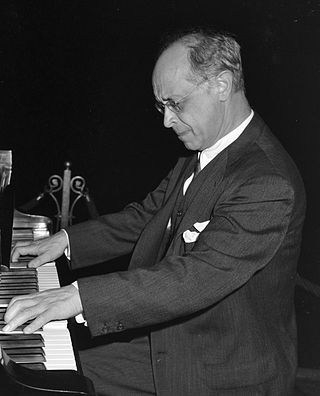Related Research Articles
The 19th Annual Grammy Awards were held on February 19, 1977, and were broadcast live on American television (CBS). It was the seventh and final year Andy Williams hosted the telecast. The ceremony recognized accomplishments by musicians from the year 1976.
The 18th Annual Grammy Awards were held February 28, 1976, and were broadcast live on American television. They recognized accomplishments by musicians from the year 1975.
The 2nd Annual Grammy Awards were held on November 29, 1959, at Los Angeles and New York. They recognized musical accomplishments by performers for the year 1959. Hosted by Meredith Willson, this marked the first televised Grammy Award ceremony, and it was aired in episodes as special Sunday Showcase. It was held in the same year as the first Grammy Awards in 1959, and no award ceremony was held in 1960. These awards recognized musical accomplishments by performers for that particular year. Frank Sinatra and Duke Ellington each won three awards.

Arthur Rubinstein KBE OMRI was a Polish-American pianist. He is widely regarded as one of the greatest pianists of all time. He received international acclaim for his performances of the music written by a variety of composers and many regard him as one of the greatest Chopin interpreters of his time. He played in public for eight decades. His repertoire also included the works of Beethoven, Mozart, Schubert, Liszt, Tchaikovsky, Saint-Saëns, Schumann and more.

Henryk Bolesław Szeryng was a Polish-Mexican violinist.

Joan Tower is a Grammy-winning contemporary American composer, concert pianist and conductor. Lauded by The New Yorker as "one of the most successful woman composers of all time", her bold and energetic compositions have been performed in concert halls around the world. After gaining recognition for her first orchestral composition, Sequoia (1981), a tone poem which structurally depicts a giant tree from trunk to needles, she has gone on to compose a variety of instrumental works including Fanfare for the Uncommon Woman, which is something of a response to Aaron Copland's Fanfare for the Common Man, the Island Prelude, five string quartets, and an assortment of other tone poems. Tower was pianist and founding member of the Naumburg Award-winning Da Capo Chamber Players, which commissioned and premiered many of her early works, including her widely performed Petroushskates.
Emil Grigoryevich Gilels was a Soviet pianist. He is widely regarded as one of the greatest pianists of all time.

Rudolf Serkin was a Bohemian-born Austrian-American pianist. He is widely regarded as one of the greatest Beethoven interpreters of the 20th century.

William Steinberg was a German-American conductor.

Robert Nathaniel Mann was a violinist, composer, conductor, and founding member of the Juilliard String Quartet, as well as a faculty member at the Manhattan School of Music. Mann, the first violinist at Juilliard, served on the school's string quartet for over fifty years until his retirement in 1997.

Geoffrey Peter Bede Hawkshaw Tozer was an Australian classical pianist and composer. A child prodigy, he composed an opera at the age of eight and became the youngest recipient of a Churchill Fellowship award at 13. His career included tours of Europe, America, Australia and China, where he performed the Yellow River Concerto to an estimated audience of 80 million people. Tozer had more than 100 concertos in his repertoire, including those of Mozart, Beethoven, Liszt, Brahms, Tchaikovsky, Medtner, Rachmaninoff, Bartók, Stravinsky, Prokofiev and Gerhard.
Peter Donohoe CBE is an English classical pianist.

Kevin Kenner is an American concert pianist.

Emanuel "Manny"Ax is a Grammy-winning American classical pianist. He is known for his chamber music collaborations with cellist Yo-Yo Ma and violinists Isaac Stern and Young Uck Kim, as well as his piano recitals and performances with major orchestras in the world.

Radu Lupu was a Romanian pianist. He was widely recognized as one of the greatest pianists of his time.
Ronald Turini is a world renowned Canadian classical pianist. He is the first Canadian artist to win prizes at the Ferruccio Busoni International Piano Competition and the Geneva International Music Competition, both in 1958, and the 1960 Queen Elisabeth Competition, where he was acclaimed by juror Emil Gilels. He was an acknowledged student of Vladimir Horowitz, and was known to be Horowitz' personally most highly regarded student.
Boris Berman is a Russian pianist and pedagogue.
Joseph Murray Banowetz was an American pianist, pedagogue, author, and editor, who taught at the University of North Texas. Banowetz was an expert on the music of the Russian romantic composer Anton Rubinstein.

Daniil Olegovich Trifonov is a Russian pianist and composer. Described by The Globe and Mail as "arguably today's leading classical virtuoso" and by The Times as "without question the most astounding pianist of our age", Trifonov's honors include a Grammy Award win in 2018 and the Gramophone Classical Music Awards' Artist of the Year Award in 2016. The New York Times has noted that "few artists have burst onto the classical music scene in recent years with the incandescence" of Trifonov. He has performed as soloist with such orchestras as the Philadelphia Orchestra, New York Philharmonic, Cleveland Orchestra, Royal Philharmonic Orchestra, London Symphony Orchestra, Mariinsky Theatre Orchestra, Royal Concertgebouw Orchestra, Berlin Philharmonic, San Francisco Symphony, Montreal Symphony Orchestra, Houston Symphony and the Munich Philharmonic, and has given solo recitals in such venues as Royal Festival Hall, Carnegie Hall, John F. Kennedy Center for the Performing Arts, Berliner Philharmonie, Théâtre des Champs-Élysées, Concertgebouw, and the Seoul Arts Center.
Timothy McAllister is an American classical saxophonist and music educator, who, as of 2014, is Professor of Saxophone at the University of Michigan School of Music, Theatre & Dance.
References
- ↑ "Max Wilcox". Discogs .
- ↑ Roberts, Sam (February 2017). "Max Wilcox, Grammy-Winning Record Producer, Dies at 88". The New York Times.
- ↑ Brady, Stephen H. (15 October 2011). Under the Lid: The Art & Craft of the Concert Piano Technician. BookBaby. ISBN 9781618424594.
- ↑ "Max Wilcox". 23 November 2020.
- ↑ "Max Wilcox Songs, Albums, Reviews, Bio & More". AllMusic .